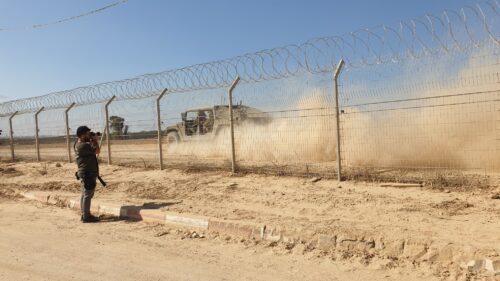Hamas has long maintained a resolute stance: no further hostage releases without a permanent ceasefire, Israel’s complete withdrawal from Gaza, and firm guarantees against renewed hostilities. In essence, Hamas is playing a high-stakes game, bartering its survival as Gaza’s de facto governing power. This strategy ensures the group’s ability to regroup, rearm, and plan future assaults on Israel, biding its time for another chapter in its protracted conflict. Yet, the sudden release of American-Israeli hostage Edan Alexander on the eve of President Donald Trump’s Middle East visit in May 2025 challenges this narrative, raising questions about the true motives at play. The notion, advanced by some media outlets, that Hamas freed Alexander as a magnanimous gesture to Trump without expecting reciprocity strains credulity and suggests a deeper, calculated agenda.
Hamas’s release of Alexander, the only living American hostage in its custody, was not an act of altruism but a meticulously orchestrated move, coordinated with its patron, Qatar. Reports suggest Hamas may have secured assurances of increased humanitarian aid through Israel’s border crossings, a claim the Israeli government firmly denies. Even if true, this alone would not explain Hamas’s abrupt shift. The real prize lies in the broader geopolitical landscape, where Qatar, posing as a neutral mediator, exerts significant influence.
Qatar’s Art of “Trump Diplomacy”
Qatar has a documented history of shaping hostage negotiations to Hamas’s advantage, reportedly advising the group to delay concessions for better terms. For instance, during talks in 2023 and 2024, Qatari intermediaries allegedly disrupted agreements by promising Hamas more favorable outcomes (The New York Times, 2023). In Alexander’s case, Qatar likely advised Hamas that freeing a high-profile American would resonate with Trump, a leader known for his transactional approach and appetite for diplomatic wins. By delivering a foreign policy triumph, Qatar and Hamas aim to secure influence, bypassing Israel and positioning themselves as key partners in Trump’s pursuit of high-profile “peace” achievements.
Qatar has honed what might be called “Trump Diplomacy”—a strategy of flattery, financial incentives, and personal engagement that aligns with Trump’s preference for deal-making and loyalty. During Trump’s first term, Qatar spent $465,744 at Trump properties, raising concerns about violations of the U.S. Constitution’s Emoluments Clause, which prohibits federal officials from accepting foreign gifts without congressional approval (CREW, 2024). In April 2025, the Trump Organization signed a $5.5 billion deal with Qatari Diar, a state-backed real estate firm, to develop a Trump-branded golf resort in Simaisma, Qatar (Bloomberg, 2025). Most notably, Qatar’s royal family offered a $400 million Boeing 747-8, dubbed a “flying palace,” to serve as Air Force One, with the plane potentially transferring to Trump’s presidential library foundation post-tenure—a move critics view as a veiled personal gift (Reuters, 2025). Qatar’s ties extend to Trump’s inner circle; in 2018, the Qatari Investment Authority facilitated a bailout of a Manhattan property owned by Jared Kushner’s family, and in 2023, it supported a $623 million sale of the Park Lane Hotel involving Trump associate Steve Witkoff.
Trump’s Adaptive Foreign Policy
Trump’s foreign policy, often described as bold and instinctive, emphasizes high-impact gestures and visible outcomes. Committed to fostering peace and reducing conflicts, Trump’s strategies adapt to domestic political dynamics and the perspectives of his supporters. For example, in early 2025, he adopted a firm stance toward Iran, issuing strong warnings, but later softened his rhetoric to pursue negotiations after pushback from restraintist-isolationist MAGA figures like Tucker Carlson and Marjorie Taylor Greene, who opposed escalation (Fox News, 2025).
Trump’s willingness to adjust course is evident when ambitious proposals meet practical challenges. His “Trump Gaza Plan,” announced in January 2025, proposed relocating parts of Gaza’s population to Jordan and Egypt by threatening to cut international aid—a plan abandoned after advisors warned of diplomatic and regional fallout (Reuters, 2025). Similarly, his proposal for broad tariffs, including a 25% levy on Chinese imports, was scaled back when advisors highlighted risks of inflation and supply chain disruptions (Bloomberg, 2025). His 2018 pledge to withdraw U.S. troops from Syria was also reversed after Pentagon officials cautioned about a resurgent ISIS threat (CNN, 2019). These adjustments reflect Trump’s openness to pragmatic guidance, enthusiasm for innovative ideas, and skill as a marketer in prioritizing impactful presentations.
Qatar’s Strategic Influence and Trump’s Responsiveness
Qatar, adept at strategic branding, recognizes Trump’s preference for tangible results over intricate policy details. By facilitating Alexander’s release, Qatar delivers a concrete achievement, reinforcing Trump’s image as a consummate dealmaker. This move establishes a diplomatic channel that marginalizes Israel, positioning Qatar as a linchpin in Trump’s peace agenda. Qatar likely convinced Hamas that releasing Alexander—a tactical concession—was a long-term investment in Trump’s goodwill, aligning with Hamas’s softened messaging about releasing all hostages if the war ends, which portrays Israel as the intransigent party (Al Jazeera, 2025). If Trump, eager for swift successes, views Qatar as a reliable partner, he may encourage Israel to pause its campaign in Gaza, a prospect Israel firmly opposes.
Trump’s decision-making, far from rigid, is shaped by a diverse array of voices, as noted by former aides in Bob Woodward’s 2020 book Rage (Simon & Schuster, 2020). His intuitive, emotion-driven approach often prioritizes personal rapport, making him receptive to those who build trust and offer compelling narratives.
Middle East Tour and Regional Maneuvering
Following Trump’s Middle East tour, Qatar and Saudi Arabia leveraged their relationships with him, employing gestures of goodwill and substantial economic commitments. These nations, capitalizing on financial ties and personal rapport, shaped Trump’s perspective to align with their interests. Saudi Crown Prince Mohammed bin Salman persuaded Trump to freeze sanctions on Syria, presenting its new leader, Abu Mohammad al-Julani—a figure notorious for pirouetting between the latest jihadi fads, from al-Qaeda to leading the terrorist-designated Hayat Tahrir al-Sham (HTS)—as a “tough, handsome young guy” who charmed Trump into giving him a chance (Al Jazeera, 2025). Despite HTS’s history of extremist violence and its fighters’ chilling chants vowing to “march to Al-Aqsa” and spewing anti-Western rhetoric, Trump’s decision risks emboldening a regime with deep terrorist roots to rebuild unchecked. On Gaza, Trump, swayed by humanitarian concerns and vivid images of suffering, was convinced by MBS that Gaza’s civilians faced starvation. This led to intense American pressure, forcing Prime Minister Benjamin Netanyahu to lift a two-month aid blockade—a critical lever that had constrained Hamas’s ability to dominate Gaza’s population—despite unanimous cabinet opposition (Times of Israel, 2025). The blockade’s end undermined the Gaza Humanitarian Fund (GHF), a carefully designed initiative led by special envoy Steve Witkoff to deliver aid directly to Gaza’s civilians, bypassing Hamas’s practice of weaponizing aid to fuel its war machine and maintain iron-fisted control over the population. As Israel launched its latest campaign, Gideon’s Chariot, to dismantle Hamas, this decision to allow unrestricted aid risks empowering Hamas, potentially prolonging the conflict and ensuring its survival as Trump grows impatient with a drawn-out war.
Trump’s Affinity for Personal Gestures
Trump’s responsiveness to personal gestures enhances Qatar’s influence, as his history shows a preference for leaders who offer recognition or concrete wins. In 2018, North Korean leader Kim Jong-un’s flattering letters prompted Trump to pursue high-profile summits, producing photo opportunities despite limited progress on denuclearization (BBC, 2019). Qatar’s strategic moves—including a $1.2 trillion investment pledge in U.S. infrastructure and energy sectors, announced in May 2025 to bolster Trump’s economic legacy, and Alexander’s release—represent a calculated effort to build favor (Financial Times, 2025). These gestures could shape Trump’s approach, potentially encouraging concessions that affect Israel’s strategic objectives.
Broader Implications: A Diplomatic Balancing Act
Qatar’s maneuvers, with Hamas as its proxy, demonstrate sophisticated geopolitical strategy. By securing Alexander’s release, Qatar enhances its diplomatic stature and creates leverage, potentially straining U.S.-Israel relations. Israel, resolute in its mission to neutralize Hamas, risks being cast as the obstacle to peace if it resists U.S. pressure to end the conflict prematurely. Meanwhile, Qatar and Hamas gain breathing room, preserving their influence and setting the stage for future tensions. This episode highlights the complexities of Trump’s adaptive leadership style, where personal connections and high-profile achievements can significantly influence U.S. policy, sometimes at the expense of long-term strategic priorities.






